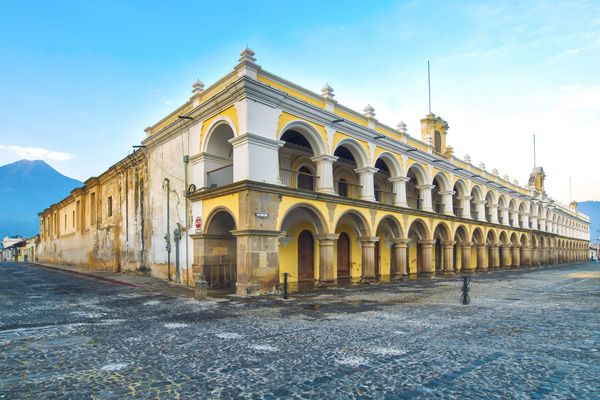Retire in Antigua Guide
Summary: If Antigua is on your retirement radar, our detailed Retire in Antigua Guide is your go-to resource. Delve into the crucial aspects of life here, including living costs, climate, housing options, healthcare services, and residency procedures. We also explore the city's social dynamics, volunteering scenes, transportation, and how walkable its neighborhoods are.

Retiring in Antigua is a dream come true for many international retirees. The city's rich history, vibrant culture, and stunning natural beauty make it an ideal destination for those seeking a relaxed and fulfilling retirement. However, like any foreign country, there are both advantages and challenges to retiring in Antigua.
Cost of Living
One of the biggest draws for retirees is the affordable cost of living in Antigua. From housing to groceries, prices are significantly lower than in many Western countries. For example, a comfortable two-bedroom apartment in the city center can be rented for as little as $500 a month. Eating out is also a bargain, with a meal at a local restaurant costing around $5.
Climate
Antigua boasts a pleasant climate year-round, with average temperatures ranging from 55 to 75 degrees Fahrenheit. The city experiences a rainy season from May to October, but even then, the showers are usually brief and followed by sunshine. This temperate climate allows retirees to enjoy outdoor activities throughout the year.
Healthcare
Antigua is home to several high-quality private hospitals and clinics, where medical staff are often bilingual. The city is also just an hour's drive from Guatemala City, which has some of the best healthcare facilities in Central America. However, it's worth noting that while healthcare costs are lower than in the U.S., they can still be significant, especially for major procedures.
Public Healthcare System
While Guatemala does have a public healthcare system, it is generally not used by international retirees due to its limited resources and long wait times. Instead, most retirees opt for private health insurance, which is affordable and provides access to private hospitals and clinics.
Residency Options for Retirees
Guatemala offers a pensionado (retiree) visa, which allows international retirees to live in the country indefinitely. To qualify, retirees must have a monthly income of at least $1,000 from a pension or social security.
Parks and Recreational Activities
Antigua is a paradise for nature lovers, with numerous parks and hiking trails. The city is also a UNESCO World Heritage site, boasting beautiful colonial architecture and cobblestone streets. For those interested in culture, there are many museums, art galleries, and music festivals to enjoy.
Restaurants
Antigua is known for its vibrant food scene, with a wide range of restaurants catering to all tastes and budgets. Some popular spots include Rincon Tipico, a local favorite for traditional Guatemalan cuisine, and Hector's Bistro, known for its French-inspired dishes.
Learning the Language
While Spanish is the official language of Guatemala, English is widely spoken in Antigua, especially in tourist areas. However, learning Spanish can enrich your retirement experience. Schools like the Antigüeña Spanish Academy offer affordable language classes for all levels.
Local Culture
The locals in Antigua are known for their friendliness and hospitality. The city has a relaxed pace of life, with siestas still a common practice. Antigua also has a strong indigenous culture, with many locals wearing traditional Mayan clothing and practicing ancient customs.
Meeting People and Volunteering
Meeting new people is easy in Antigua, with many social clubs and organizations catering to international retirees. Volunteering is also popular, with opportunities to get involved in community projects, teach English, or work with local charities such as the Antigua International School.
Housing and Transportation
Most retirees choose to live in the city center, where they can walk to shops, restaurants, and cultural sites. Public transportation is reliable and inexpensive, making it easy to get around without a car. For those who prefer a quieter lifestyle, there are also many beautiful homes in the surrounding countryside.
About the Author
 Betsy Burlingame is the Founder and President of Expat Exchange and is one of the Founders of Digital Nomad Exchange. She launched Expat Exchange in 1997 as her Master's thesis project at NYU. Prior to Expat Exchange, Betsy worked at AT&T in International
and Mass Market Marketing. She graduated from Ohio Wesleyan University
with a BA in International Business and German.
Betsy Burlingame is the Founder and President of Expat Exchange and is one of the Founders of Digital Nomad Exchange. She launched Expat Exchange in 1997 as her Master's thesis project at NYU. Prior to Expat Exchange, Betsy worked at AT&T in International
and Mass Market Marketing. She graduated from Ohio Wesleyan University
with a BA in International Business and German.
Some of Betsy's articles include 12 Best Places to Live in Portugal, 7 Best Places to Live in Panama and 12 Things to Know Before Moving to the Dominican Republic. Betsy loves to travel and spend time with her family. Connect with Betsy on LinkedIn.
Additional Information:



